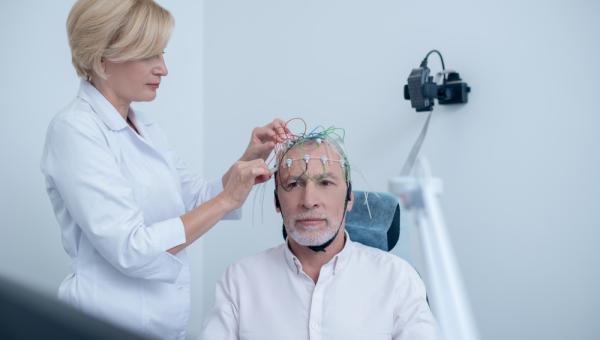Healthy Lifespan
How can we integrate biological, social, and psychological perspectives when investigating development over the lifespan?
Research Focus
Three seismic demographic changes make the promotion of a healthy work/life course more important than ever. First, Western societies are ageing rapidly, which has manifold implications. For instance, there will be a much larger percentage of elderly people (including in the workforce), with their unique challenges and needs for health and well-being (e.g., loneliness in old age). This will undoubtedly change how the generations relate to each other.
Second, life expectancy is increasing, meaning that people die less often from acute illness and have to cope increasingly with chronic illnesses, the foundations of which are often laid at much younger ages. This implies that interventions to promote healthy lifestyles have to adopt a lifespan perspective, and start already in childhood (or even during pregnancy) and reach individuals through multiple channels (education, workplaces, society).
Third, the increasingly rapid technological transformations of society imply that existing knowledge will become more easily outdated, and a job for life might become a thing of the past. To accommodate this shift, promoting lifelong learning and employability is a key challenge, both in children and adolescents (preparing them with non-cognitive skills like creativity and willpower) and adults (helping them to adapt to changing skill demands).
Interdisciplinary Approach
All these topics require an interdisciplinary approach that integrate biological, social, and psychological perspectives. Such integration will shed light on key scientific issues, like how the brain develops and ages, how complex educational and work-related skills are learned and retained, how individuals navigate and master key social roles and tasks, how healthy social relationships (including intergenerational relationships) are established and preserved, and how meaningful life outcomes, like psychological and physical health, eudemonic well-being and personal growth, can be promoted and protected even under difficult circumstances.
Research Networks:
Cross-cutting Theme Coordinator:
Current PhD projects:
-

Identifying and Bolstering Emotional Resources for Daily Cognitive Functioning Across the Adult Lifespan [PhD Project]
The proposed project aims to identify age-specific emotional resources to aid people with cognitive job demands like administrative tasks or programming.
More information -

The Emotions Within: Improving the Accuracy and Impact of Emotion Measurement in Wellbeing Across the Lifespan [PhD project]
This project aims to develop ecologically valid, contextually sensitive measures of emotion that can be used in intensive, longitudinal, within-person research such as experience sampling (ESM) and applies these to concrete questions of emotions-wellbeing dynamics across the lifespan and during major life events.
More information -

Transition From University to Work: Understanding Personality Development [PhD Project]
The project team will conduct an intensive longitudinal study on environmental and individual factors and processes of personality development during the work transition.
More information
[Project duration: 2020 - 2024] -

The Transition to Parenthood: Individual Variability in Well-Being [PhD Project]
The project’s overarching goal is to examine whether the transition to parenthood might have different consequences for different aspects of psychological well-being and for different individuals.
More information
[Project duration: 2021 - 2025] -

Going Against the Norm: Links between Personality, Well-Being, and Deviating Family Trajectories in Young Adulthood [PhD Project]
The project team will conduct a study on links between personality, well-being, and deviating family trajectories in young adulthood.
More information
-

Developing Workplace Interventions to Stimulate a Healthy Working Life for All [PhD Project]
Stress is a major adversary in the pursuit of long, healthy lives. Of all encountered stressors, job strain plays a substantial role throughout the adult lifespan.
More information
Current Seed Funding projects:
-

Stress Recovery Strategies in Older Adults and Their Link to Well-Being and Health [Seed Funding]
As individual differences in adaptive stress recovery have not been systematically investigated, we aim to identify differences between younger and older adults in self-reported stress recovery strategies and their relation to health and well-being. Furthermore, we aim to evaluate psychological stress recovery processes in younger and older adults in real life by using Experience Sampling Method (ESM).
More information
[Project Duration: 2022-Ongoing] -

Does Grandchild Caregiving Affect Older Adults’ Cognition and Well-being Beyond Work? [Seed Funding]
In this project, we thus take a more comprehensive perspective by including detailed information on both, grandparenting and grandparents’ work context and activities, while also studying these effects at the daily level, in an ecologically valid context.
More information
[Project Duration: 2023-Ongoing] -

Bridging the Gap: Predicting Health-Related Adaptive Behaviour Using a Novel Approach-Avoidance Paradigm [Seed Funding]
Each day we face threatening situations that guide our behaviour. Typically, as subjective threat increases, our behaviour tilts towards avoidance. While avoidance may be adaptive at times (e.g., avoiding the searing pain of a hot stove), it may result in losing out on valued activities at other times (e.g., avoiding meeting friends when sitting is associated with pain).
More information -

Neurophysiological correlates of personality-cognition relations across the adult lifespan [Seed Funding]
Using electroencephalography, this project will investigate the neural correlates of the relationship between personality and cognition across the adult lifespan.
More information
[Project Duration: 2021-Ongoing] -

Understanding the Why in Successful Ageing Among Cancer Survivors: Examining the Role of Inflammation and the Kynurenine Pathway [Seed Funding]
This project aims to identify networks of mutually interacting factors of successful ageing among cancer survivors and examine whether inflammation and imbalance of the kynurenine pathway are underlying mechanisms.
More information
[Project Duration: 2021-2022] -

Who Remains Childless? [Seed Funding]
Dr. Ivanova and Dr. van Scheppingen combine insights from personality psychology and family sociology to elucidate why some individuals among a contemporary cohort of Dutch adults do not become parents.
More information
[Project duration: 2020 - 2021] -

The Tooth Fairy Project: Baby Teeth as Biological 'Hard Drives' for Stress Research Over the Lifespan [Seed Funding]
Research into the effect of maternal stress during pregnancy on child development outcomes is important, since stress exposure has been linked to negative developmental and behavioral outcomes (e.g. cognition and temperament. However, studies are usually expensive and intensive, especially when longitudinal effects are examined, or biomarkers are included.
More information -

Unraveling Positive Emotion Regulation Across The Lifespan [Seed Funding]
Which processes drive positive emotion regulation across the lifespan? Although there is an abundance of research on how people regulate their negative emotions, there is a paucity of research on positive emotion regulation. Yet, positive emotion regulation may play a critical role in the development of emotional disorders and well-being. This project will chart new territory by addressing four critical limitations that mark current research in this field to advance both theory and interventions to increase well-being across the lifespan.
More information -

Innovating Memory Care: Strategy-Based Digital Rehabilitation Tools for the Aging Population [Seed Funding]
This study aims to address memory decline in older adults by exploring the potential of Virtual Reality (VR) for memory strategy training, targeting improvements in everyday functioning. By combining expertise in cognitive and developmental psychology, the project seeks to develop and evaluate innovative VR tools for memory enhancement, offering promising avenues for cognitive training in healthy and pathological aging.
More information
